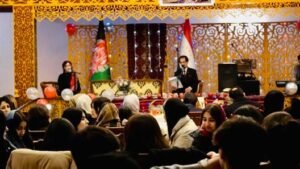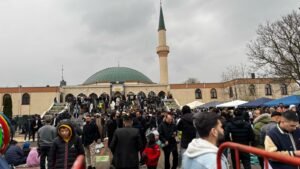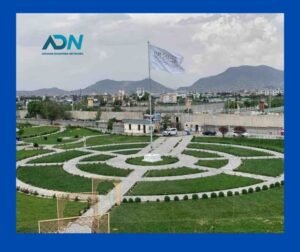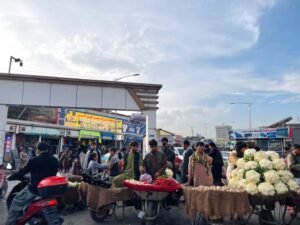Afghan Diaspora in Vienna Marks 106th Independence Day with Critical Reflections
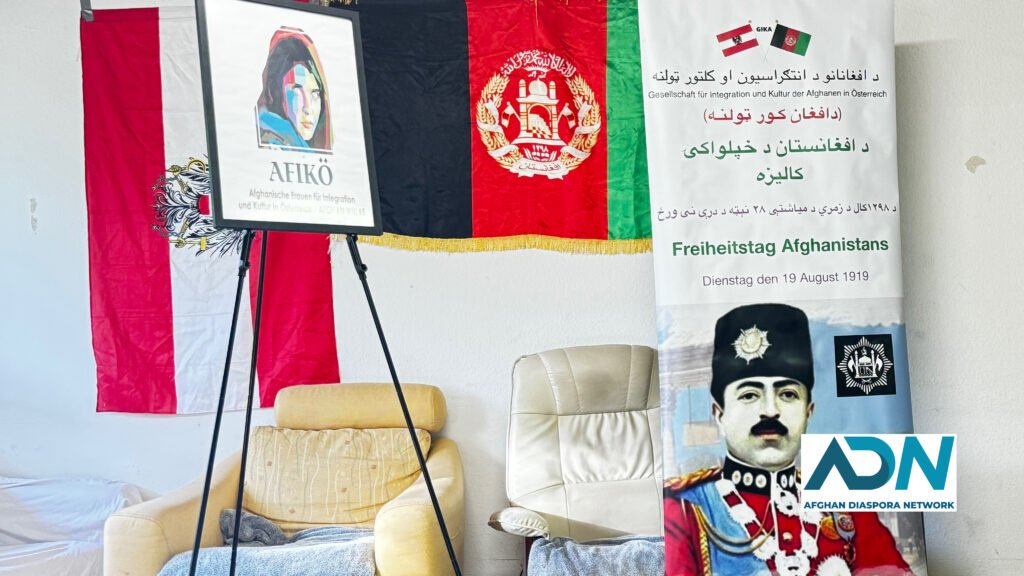
Photo: @Ali Ahmad for ADN
ADN
On August 23, 2025, a coalition of Afghan associations in Vienna organized a gathering to commemorate the 106thanniversary of Afghanistan’s independence. The event, held in a modest residential building on the outskirts of the city, brought together members of the Afghan diaspora to reflect on the meaning of independence, the legacy of King Amanullah Khan, and the continuing challenges Afghanistan faces in asserting genuine sovereignty.
The setting was simple yet symbolic. The room was decorated with the tricolor Afghan flag, and the program included recitations of poetry on independence, underscoring both national pride and nostalgia.
Despite the significance of the occasion, participation was limited, with only a small number of attendees present. Notably, just two women took part, highlighting ongoing concerns about women’s representation in diaspora community events. Some participants pointed to cultural norms and social expectations as reasons for this absence, while others suggested it reflects wider struggles of inclusivity within Afghan political and cultural life abroad.
Remembering Amanullah Khan
The discussion opened with a presentation on the legacy of King Amanullah Khan, who declared Afghanistan’s independence following the Third Anglo-Afghan War in 1919. Speakers highlighted Amanullah’s ambitions for reform and modernization, his role in securing recognition of Afghanistan’s sovereignty through the Rawalpindi Treaty, and his enduring place in Afghan national memory.
At the same time, the speakers acknowledged the many obstacles he faced, both internally and externally, in fulfilling his vision for a more progressive Afghanistan.
Building on this introduction, Fazel Rahman, president of the Afghan Wulas Cultural and Sport Association, emphasized the importance of commemorating Amanullah Khan as a reformist and visionary leader. He recalled that Amanullah remains recorded in Afghan history as a figure of modernization and national pride.
At the same time, Rahman offered a more critical assessment. He argued that Afghanistan achieved only political independence, while broader aspirations for territorial integrity remained unfulfilled.
He pointed in particular to the issue of the Durand Line, noting that under the Rawalpindi Treaty, Pashtun and Baloch lands were left outside Afghanistan’s control, despite the demands of its people.
Rahman further stressed Afghanistan’s unique historical position compared to its neighbors. While the British Empire fought three wars in Afghanistan and occasionally installed political proxies, Afghanistan was never fully subjugated or incorporated into the British Empire like India.
Kingship, he insisted, was determined by Afghans themselves, not by foreign approval. Yet, in his view, Afghanistan’s sovereignty from the outset was limited by geopolitical compromises.
Broader Meaning of Independence
Throughout the discussion, moderator Zarif Safi encouraged participants to explore the broader significance of independence beyond politics. Safi argued that true sovereignty cannot be reduced to freedom from foreign control.
“Independence is not a gift to be gained,” Safi said, stressing that it also requires cultural preservation, educationaladvancement, and economic self–reliance. Without these elements, political freedom remains incomplete.
Others reflected on Amanullah Khan’s downfall, attributing it partly to opposition from religious leaders. Some claimed that clerics aligned with foreign powers exploited the situation and provoked unrest, undermining reform efforts.
For these participants, the episode illustrated how external manipulation and internal divisions combined to weaken Afghanistan’s independence project, a pattern that, they suggested, has repeated throughout the country’s modern history.
Diaspora Challenges
The gathering also prompted self-reflection within the diaspora. Several participants questioned why commemorations of such an important national day in Vienna drew only a limited audience.
The lack of women’s participation, with just two present, was highlighted as particularly concerning. Some attributed this to cultural factors, while others saw it as part of a broader struggle for inclusivity in Afghan community life abroad.
In addition, speakers linked Afghanistan’s past independence struggles to more recent experiences of foreign intervention, including the Soviet occupation and the U.S.-led intervention after 2001. For them, Independence Day was not only about celebrating history but also about recognizing the unfinished work of achieving genuine sovereignty in the present.
The Vienna gathering revealed the ambivalence of celebrating Afghanistan’s independence in exile.
Pride in Afghanistan’s resilience against colonization and recognition of Amanullah Khan’s role were coupled with critiques of unfulfilled aspirations and repeated foreign interference.
The modest setting, low turnout, and limited participation of women underscored the challenges of mobilizing diaspora communities, yet the discussions reflected a deep engagement with Afghanistan’s history and its future.
For the Afghan community in Vienna, Independence Day was less a ceremonial occasion and more a moment of criticalreflection, a reminder that independence is not merely declared but must be continually defended, expanded, and redefined.


